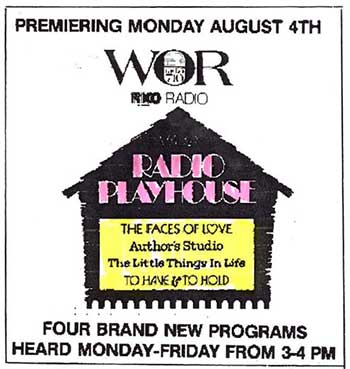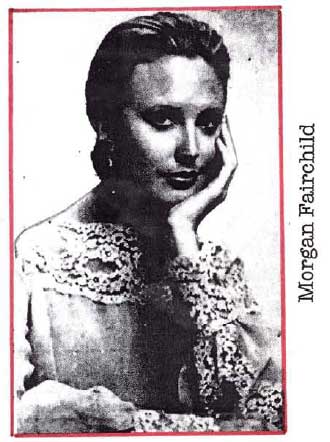CURTAIN CALL FOR MUTUAL'S QUARTETTE
Radio Playhouse & The Faces of Love
By Jim Widner © 2009
(From Radio Recall, December 2009)
I began collecting in the early seventies just as there was a resurgence of dramatic radio at the start of that decade. While I have fond memories of listening to the last of radio drama in the early sixties, I was actually a child of television having grown up in the fifties, and most of my radio drama experience came from the programs that were broadcast as a result of the resurgence.
During that period, it seemed as if there was no end to radio drama as many stations began carrying the programs that gave many of today’s young collectors their spark of interest in the hobby. I was familiar with many of the programs being broadcast, but was surprised when Jack French, your editor, brought to my attention some episodes of a radio soap called The Faces of Love which the Old Time Radio Researchers organization released recently in one of their Distribution CDs. Neither Jack nor I had ever heard of the program and that sparked the two of us to want to find out more.
After its offering of the Zero Hour in 1973 and its subsequent demise of that series due to low response, the Mutual Broadcasting System decided to try again creating a series of four programs under an umbrella called Radio Playhouse.
Radio Playhouse was originally the name of the umbrella created by Mutual in 1953 through which it offered over 1 million dollars worth of transcribed series to its network. Using the same concept, the umbrella of four programs premiered over WOR Mutual on August 4th, 1975. The series was produced by a division of Young and Rubicom, one of the major advertising agencies of the time. Richard Cox was the creator and producer of the series and head of Young and Rubicam Ventures, a division of the advertising agency.
The four programs would run Monday through Friday, originating out of the WOR studios and available to Mutual Network subscribing stations. Each of the four programs would be fifteen minutes in length and run contiguously thus creating a single hour long program umbrella each day. The programs’ storylines all were themed to women and with a touch of feminist rebellion prevalent in the culture in the mid-seventies. The broadcast time was from three to four o’clock PM near the end of the Daytime serial broadcast period.
First off was: The Faces of Love, which Mutual described in publicity releases:
“Suddenly, a young woman is thrust, completely unprepared, into a life of complete freedom. Her traditional background conflicts with her new-found freedom to confront her with difficult decisions at every turn.”
Program two was Author’s Studio, which Mutual summarized in these words:
“Dramatizations of famous novels in serialized form, the first of which is William Makepeace Thackeray’s Vanity Fair. A romantic story featuring the bright and clever Becky Sharp, a liberated woman a century ahead of her time.”
The third program was The Little Things in Life, written by a name well-known to old time radio fans: Peg Lynch, creator of the probably better known Ethel and Albert. This Lynch creation was to be:
“A light-hearted and high-spirited program which takes a fond and good-natured look at the trivialities which serve to frustrate us in our daily lives. You’ll recognize and identify with the events in the series.”
Finally, the last quarter was To Have & To Hold:
which Mutual characterized as:
“The stresses and demands which face two families of doctors who are daily involved with life and death decisions is the setting for this highly-charged dramatic program. You’ll agonize and sympathize as the doctors mix the volatile combination of emotion and intellect in a contemporary society.”

When Radio Playhouse premiered in 1975, The Faces of Love in its initial offering starred Joan Lorring and Mason Adams with Jackson Beck announcing. I haven’t heard any episodes of that run, so I’m not sure about the storyline. The second run starred a young and upcoming Morgan Fairchild as Kate Wakefield. In an email exchange with Ms. Fairchild, she told me she was living in New York City at the time and working on the television drama, Search for Tomorrow as well as appearing occasionally on Kojak and doing commercials.
In addition she had appeared on some of the CBS Radio Mystery Theatre shows, created and directed by Himan Brown. She said she got the role of Kate Wakefield because of her appearances on Radio Mystery Theatre. “There were a lot of name actors doing them and we had so much fun!” she wrote. For her radio appearances she only got AFTRA scale of $44.00 an episode!
Yet Ms. Fairchild felt it well worth the low pay for an up and coming young actress: “I got to meet so many good actors and they [the radio programs] were a hoot to work on. Also, as a young actor, I loved being able to use only my voice to convey a scene. I thought it was good training for me.”
I originally had stated in my email to her that she had appeared occasionally on Search for Tomorrow but she corrected me: “I was not ‘appearing occasionally’ on Search at the time. I was one of the regulars on it [playing the paranoid murderess, Jennifer Pace Phillips]. Susan Lucci and I were emerging as the early ‘bitch goddesses’ of daytime, as the genre went through the transformation from ‘kitchen table discussion’ shows to more high style and upscale formats.”
The title of the program, The Faces of Love, apparently comes from its opening: “Love is gentle, faithful, swift, passionate, blind and wondrous. All these are ‘faces of love’.” The gist of the storyline, at least for the programs available, has the now-widowed Kate Wakefield working for a Real Estate company in a city in the U.S. Her late husband, Tom Wakefield, apparently had been involved in drug smuggling as well as being an addict himself.
His death apparently is a mystery, but he died near Glory Point in Jamaica the location of the one hundred year old estate, now-in-decline, and belonging to the Pomeroy family. Kate decides to visit the family seemingly in search of both her past life with Tom and looking for the real cause of Tom’s death.
The series was written by Margaret Lewerth, a veteran radio writer with roots in the late thirties. Her credentials include the Columbia Workshop (adaptation of Stephen Crane’s Red Badge of Courage and others), Cavalcade of America, Ford Theater, Powder Box Theater, and Americans at Work. Her work in the soap genre includes a stint in the Frank & Anne Hummert radio factory where she penned a soap called Helpmate (1941-1944).
Besides Morgan Fairchild, the other primary star was Clement Fowler (as Lewis Pomeroy), who had an extensive stage acting career as well as film and television. In later life Fowler had an extensive career in daytime television serials based out of New York City. The veteran actor just recently passed away in August 2009 at the age of 84.
The rest of the cast was filled out by oft-appearing radio acting veterans based in the New York City area including Bryna Raeburn, Staats Cotsworth, Teri Keane, Mason Adams, Joan Shea and many others. Mel Brandt was the regular announcer.
In her email to me, Ms. Fairchild stated she loved the training the radio series gave her in using her voice to convey a scene. This is somewhat surprising because, quite frankly, she is very, very good in the role of Kate Wakefield. Considering this was early in her career, she is amazingly adept at emoting with her voice, sounding very natural in the role. The series is actually very well written and fun to listen to though the existing copies in the OTRR library have no dates. It is easy enough to put them in order even if the dates are missing.

In creating the hour long series, Radio Playhouse, Richard Cox explained that its genesis was somewhat fortuitous. At a lunch with one of his clients, Bristol Myers, the company officials were complaining about the costs of television sponsorship. Cox, a self-described radio fan, suggested radio as a medium for sponsoring a program.
During the course of that lunch, the ad exec had mapped out an hour long umbrella consisting of “two soaps, the adaptation of a famous novel or play, and the comedy.” The show was offered to stations on a barter basis in which Bristol Myers got six minutes of commercial time and local stations would get 12 minutes to fill with their own sponsors.
At the time, and ultimately what occurred, the idea of a new dramatic program was considered “an uphill fight.” By 1975 when this series debuted, Mutual had already pulled its free offerings to local stations including Zero Hour because of disappointing response. Others had also failed. Though he was hopeful at the time, so too, Radio Playhouse including The Faces of Love would end its run and leave the air by summer’s end in 1976 after 26 weeks.
|